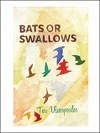The characters in Teri Vlassopoulos’s debut short story collection, Bats or Swallows, are trying to make sense of themselves and the world. Many are in that purgatory between adolescence and adulthood, when the security of childhood erodes and the ugly complexities of the self and human experience are revealed. Using signs, symbols, and other tools of the occult – a secret handshake, a palm reading, psychic powers – they seek meaningful human connections and the comfort in knowing there is a higher power governing their fates.
In “Swimming Lessons,” a young woman struggles to come to terms with the drowning death of her father when she was a little girl. Moving from Toronto to Montreal for school, she meets a young man whose little sister died when he was sixteen. She falls in love with their shared tragedy, looking for solace in her infatuation with him. Vlassopoulos’s voice carries a sweet, palpable honesty, peppering the story with lines that tickle the heart. “His hair in my hand curled just like a Fibonacci spiral,” the main character observes, “the kind of perfection you only find in nature.”

Bats Or Swallows
Teri Vlassopoulos
Invisible Publishing
$16.95
paper
144pp
9781926743073
It is this whimsical and charmingly naïve tone that makes these stories easy to read and their moments of depth sometimes surprising. Vlassopoulos began as a writer by creating zines, those photocopied quasi-diaries defined by their heart-on-sleeve quality. While this influence has infused her writing with a delicate simplicity, she sometimes gives in to the urge to tell rather than show, wrapping up her character’s feelings or thoughts too neatly or dissecting metaphors until there’s no meat left. The voice is a young one and, although strong, it tends to make the few adult characters seem like caricatures.
But the strength of this debut collection far outshines its small imperfections. Stories like “Art History,” “What You Want and What You Need,” and “Bats or Swallows” are carefully crafted portraits of life with endearing characters the reader can stand behind. A work of literary fiction, this collection would also resonate with teens and young adults, who might see parallels between themselves and the young protagonists. Vlassopoulos has found a way to carry over the wide-eyed curiosity and innate goodness of childhood into the mysterious, often sad, often tragic world of adulthood. The confidence in the voice, the originality of style and the achingly beautiful images are evidence of greatness to come from this engaging young writer. mRb






0 Comments